从信息论视角看公司简介英文译文的信息过载问题
信息爆炸分散注意力英语作文
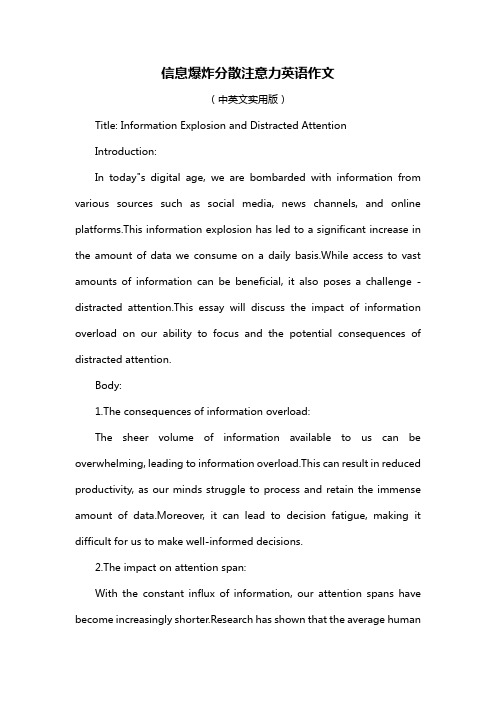
信息爆炸分散注意力英语作文(中英文实用版)Title: Information Explosion and Distracted AttentionIntroduction:In today"s digital age, we are bombarded with information from various sources such as social media, news channels, and online platforms.This information explosion has led to a significant increase in the amount of data we consume on a daily basis.While access to vast amounts of information can be beneficial, it also poses a challenge - distracted attention.This essay will discuss the impact of information overload on our ability to focus and the potential consequences of distracted attention.Body:1.The consequences of information overload:The sheer volume of information available to us can be overwhelming, leading to information overload.This can result in reduced productivity, as our minds struggle to process and retain the immense amount of data.Moreover, it can lead to decision fatigue, making it difficult for us to make well-informed decisions.2.The impact on attention span:With the constant influx of information, our attention spans have become increasingly shorter.Research has shown that the average humanattention span has decreased significantly in recent years.This is partly due to the instant gratification provided by digital devices, which train our minds to seek constant stimulation.As a result, we find it harder to focus on long-term tasks or engage in deep reading and contemplation.3.The consequences of distracted attention:Distracted attention can have detrimental effects on both personal and professional aspects of life.In personal relationships, it can lead to a lack of meaningful connections, as we spend more time engrossed in our devices.In the workplace, it can hinder creativity and problem-solving abilities, as our minds are preoccupied with multiple tasks.Furthermore, distracted attention can affect our memory and learning capabilities, as our minds struggle to retain information amidst the constant distractions.4.Strategies to combat distracted attention:To mitigate the negative effects of information overload and distracted attention, it is essential to adopt strategies that promote focus and productivity.One such strategy is to set boundaries with digital devices, limiting screen time and creating dedicated periods for deep work.Additionally, practicing mindfulness and meditation can help improve our ability to concentrate and stay present.Regular exercise and adequate rest are also crucial in maintaining a healthy attention span.Conclusion:The information explosion has undoubtedly revolutionized the waywe access and process information.However, it has also led to a significant challenge - distracted attention.The consequences of this issue are far-reaching, affecting various aspects of our lives.To combat this problem, it is essential to adopt strategies that promote focus and productivity.By doing so, we can harness the benefits of the information age while mitigating its negative impact on our attention spans.。
信息大爆炸影响的英文作文
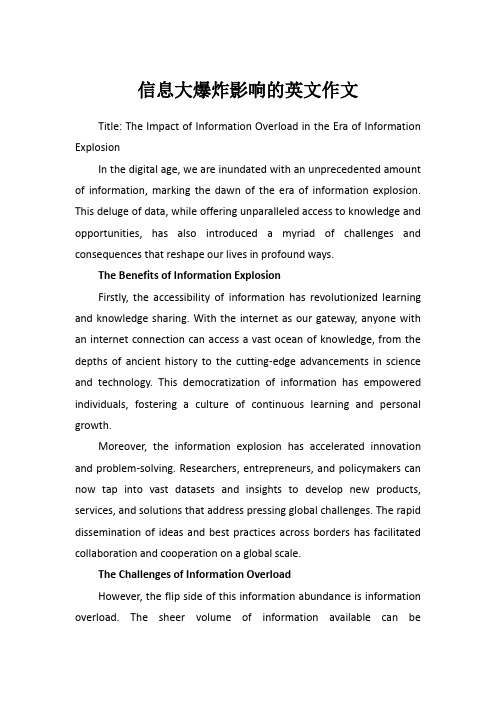
信息大爆炸影响的英文作文Title: The Impact of Information Overload in the Era of Information ExplosionIn the digital age, we are inundated with an unprecedented amount of information, marking the dawn of the era of information explosion. This deluge of data, while offering unparalleled access to knowledge and opportunities, has also introduced a myriad of challenges and consequences that reshape our lives in profound ways.The Benefits of Information ExplosionFirstly, the accessibility of information has revolutionized learning and knowledge sharing. With the internet as our gateway, anyone with an internet connection can access a vast ocean of knowledge, from the depths of ancient history to the cutting-edge advancements in science and technology. This democratization of information has empowered individuals, fostering a culture of continuous learning and personal growth.Moreover, the information explosion has accelerated innovation and problem-solving. Researchers, entrepreneurs, and policymakers can now tap into vast datasets and insights to develop new products, services, and solutions that address pressing global challenges. The rapid dissemination of ideas and best practices across borders has facilitated collaboration and cooperation on a global scale.The Challenges of Information OverloadHowever, the flip side of this information abundance is information overload. The sheer volume of information available can beoverwhelming, leading to cognitive strain and decision paralysis. With so much to process, individuals often struggle to filter out irrelevant or false information, making it difficult to discern truth from fiction.Information overload also contributes to shortened attention spans and fragmented thinking. In an era where instant gratification is the norm, people tend to skim through content rather than engage in deep reading or critical thinking. This shallow processing of information hinders our ability to form nuanced opinions, solve complex problems, and develop a comprehensive understanding of the world around us.Impact on Mental HealthFurthermore, the constant influx of information can take a toll on mental health. The fear of missing out (FOMO) and the pressure to stay informed can lead to anxiety, stress, and even depression. The constant buzz of notifications and the feeling of being connected 24/7 can blur the lines between work and personal life, eroding boundaries and exacerbating feelings of burnout.The Need for Digital Literacy and MindfulnessNavigating the era of information explosion requires a heightened sense of digital literacy and mindfulness. Digital literacy involves the ability to critically evaluate information sources, discern fact from fiction, and use technology effectively and ethically. Mindfulness, on the other hand, encourages us to be present in the moment, to cultivate awareness and attention, and to resist the temptation to constantly check our devices.In conclusion, the era of information explosion has brought about profound changes in our lives, both positive and negative. To harness its benefits while mitigating its drawbacks, we must develop digital literacyskills, cultivate mindfulness practices, and learn to navigate the vast landscape of information with discernment and intention. Only then can we truly thrive in this era of unprecedented connectivity and knowledge.。
信息爆炸分散注意力英语作文
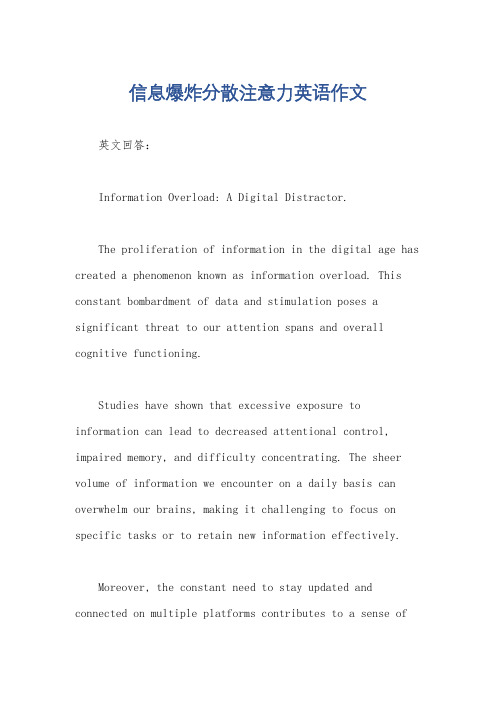
信息爆炸分散注意力英语作文英文回答:Information Overload: A Digital Distractor.The proliferation of information in the digital age has created a phenomenon known as information overload. This constant bombardment of data and stimulation poses a significant threat to our attention spans and overall cognitive functioning.Studies have shown that excessive exposure to information can lead to decreased attentional control, impaired memory, and difficulty concentrating. The sheer volume of information we encounter on a daily basis can overwhelm our brains, making it challenging to focus on specific tasks or to retain new information effectively.Moreover, the constant need to stay updated and connected on multiple platforms contributes to a sense offragmentation and distraction. We are constantly switching between different devices, apps, and social media feeds, which can lead to a decreased ability to sustain focus on any one activity.This information overload not only affects our personal lives but also has implications for productivity in the workplace. Employees struggling to manage the influx of emails, notifications, and other digital distractions may find it difficult to complete tasks efficiently and effectively.Addressing the Challenges of Information Overload.To mitigate the negative effects of information overload, several strategies can be employed.Practice Mindfulness: Engage in mindfulness practices to become more aware of your attentional patterns and to identify potential distractions.Set Boundaries: Establish clear boundaries betweenwork time and personal time to limit exposure to unnecessary information during non-working hours.Declutter Your Digital Space: Regularly declutter your devices and apps by removing unnecessary notifications and subscriptions that contribute to digital clutter.Prioritize Information: Learn to prioritize information and focus on the most important tasks and sources. Use tools like task lists and filters to manage your incoming information.Take Breaks: Take regular breaks from digital devices and activities to allow your brain to rest and recover from the constant bombardment of information.中文回答:信息爆炸,分散注意力的数字杀手。
如何应对信息过剩英语作文
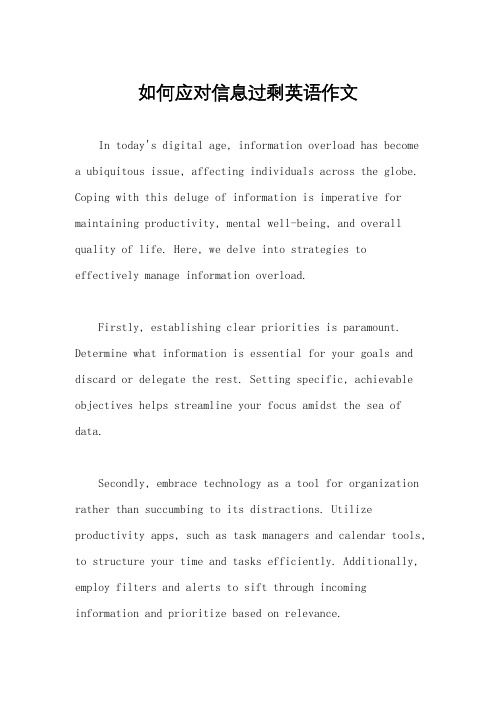
如何应对信息过剩英语作文In today's digital age, information overload has become a ubiquitous issue, affecting individuals across the globe. Coping with this deluge of information is imperative for maintaining productivity, mental well-being, and overall quality of life. Here, we delve into strategies toeffectively manage information overload.Firstly, establishing clear priorities is paramount. Determine what information is essential for your goals and discard or delegate the rest. Setting specific, achievable objectives helps streamline your focus amidst the sea of data.Secondly, embrace technology as a tool for organization rather than succumbing to its distractions. Utilize productivity apps, such as task managers and calendar tools, to structure your time and tasks efficiently. Additionally, employ filters and alerts to sift through incoming information and prioritize based on relevance.Furthermore, adopt a discerning mindset when consuming information. Not all sources are created equal, so verify the credibility and relevance of the information before investing your time and attention. Develop criticalthinking skills to evaluate sources objectively and discern fact from fiction.Moreover, practice mindful consumption by limiting exposure to unnecessary stimuli. Set boundaries for screen time, particularly on social media platforms notorious for their ability to inundate users with trivial information. Engage in activities that promote mindfulness, such as meditation or outdoor recreation, to recharge your mental faculties.In addition, cultivate a habit of continuous learning to adapt to the ever-evolving landscape of information. Develop skills in information literacy, including effective research methods and data analysis techniques, to navigate complex datasets with ease. Remain open to new ideas and perspectives while maintaining a healthy skepticism toavoid being overwhelmed by conflicting information.Furthermore, foster a supportive network of peers and mentors who can provide guidance and assistance in processing information. Collaborate with colleagues to share insights and divide the workload, leveraging collective expertise to tackle complex problems more efficiently.Lastly, prioritize self-care to mitigate the adverse effects of information overload on your well-being. Practice stress-reduction techniques, such as exercise and relaxation exercises, to alleviate the mental strain associated with information saturation. Prioritize sleep and nutrition to ensure your body and mind are equipped to handle the demands of modern life.In conclusion, confronting information overload requires a multifaceted approach encompassing technological tools, cognitive strategies, and lifestyle adjustments. By prioritizing, filtering, and discerning informationeffectively, individuals can navigate the digital deluge with confidence and clarity.。
信息过载时代批判性思维的意义的英语作文
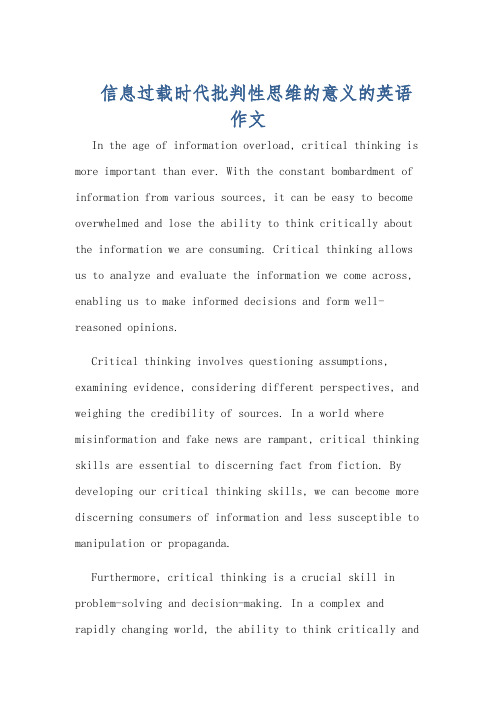
信息过载时代批判性思维的意义的英语作文In the age of information overload, critical thinking is more important than ever. With the constant bombardment of information from various sources, it can be easy to become overwhelmed and lose the ability to think critically about the information we are consuming. Critical thinking allows us to analyze and evaluate the information we come across, enabling us to make informed decisions and form well-reasoned opinions.Critical thinking involves questioning assumptions, examining evidence, considering different perspectives, and weighing the credibility of sources. In a world where misinformation and fake news are rampant, critical thinking skills are essential to discerning fact from fiction. By developing our critical thinking skills, we can become more discerning consumers of information and less susceptible to manipulation or propaganda.Furthermore, critical thinking is a crucial skill in problem-solving and decision-making. In a complex and rapidly changing world, the ability to think critically andcreatively is essential to navigating challenges andfinding innovative solutions. By approaching problems witha critical mindset, we can identify underlying issues, consider alternative solutions, and make well-informed decisions.In addition, critical thinking fosters intellectual independence and autonomy. Instead of passively accepting information at face value, critical thinkers are able to question, challenge, and explore ideas on their own. This independence of thought is empowering and allowsindividuals to form their own opinions based on reasoned analysis rather than relying on others to shape their beliefs.Overall, critical thinking is a vital skill in the information age, enabling individuals to navigate the complexities of a digital world and make informed decisions based on evidence and reason. By cultivating our critical thinking skills, we can become more discerning, independent, and empowered thinkers.在信息过载的时代,批判性思维比以往任何时候都更加重要。
信息过载时代批判性思维的意义的英语作文
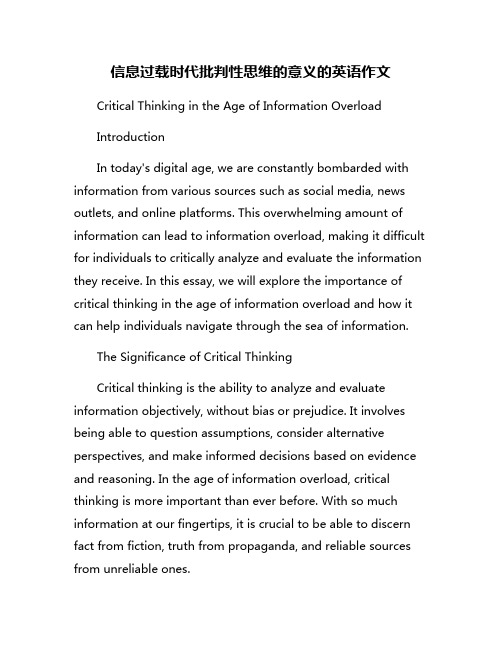
信息过载时代批判性思维的意义的英语作文Critical Thinking in the Age of Information OverloadIntroductionIn today's digital age, we are constantly bombarded with information from various sources such as social media, news outlets, and online platforms. This overwhelming amount of information can lead to information overload, making it difficult for individuals to critically analyze and evaluate the information they receive. In this essay, we will explore the importance of critical thinking in the age of information overload and how it can help individuals navigate through the sea of information.The Significance of Critical ThinkingCritical thinking is the ability to analyze and evaluate information objectively, without bias or prejudice. It involves being able to question assumptions, consider alternative perspectives, and make informed decisions based on evidence and reasoning. In the age of information overload, critical thinking is more important than ever before. With so much information at our fingertips, it is crucial to be able to discern fact from fiction, truth from propaganda, and reliable sources from unreliable ones.The Dangers of Information OverloadInformation overload can have negative consequences on our ability to think critically. When we are constantly bombarded with information, our brains can become overwhelmed, making it difficult to focus on one piece of information long enough to critically analyze it. This can lead to a reliance on shortcuts and heuristics, such as relying on our biases or emotions to make decisions, rather than taking the time to critically think through a problem.Furthermore, information overload can also lead to the spread of misinformation and fake news. In the age of social media, where anyone can publish information online, it can be challenging to separate fact from fiction. Without critical thinking skills, individuals may be more susceptible to believing false information and spreading it to others, leading to a cycle of misinformation that can have serious consequences.The Role of Critical ThinkingCritical thinking plays a crucial role in helping individuals navigate through the sea of information in the digital age. By developing critical thinking skills, individuals can:1. Evaluate information objectively: Critical thinking allows individuals to assess information from multiple sources and perspectives, enabling them to make informed decisions based on evidence and reasoning.2. Recognize biases and assumptions: Critical thinking helps individuals identify their own biases and assumptions, as well as those present in the information they receive. By being aware of these biases, individuals can avoid being swayed by misleading information.3. Understand the importance of evidence: Critical thinking teaches individuals to value evidence and reasoning over opinions and beliefs. By relying on evidence-based arguments, individuals can make more informed decisions and avoid falling victim to false information.4. Engage in discourse and debate: Critical thinking encourages individuals to engage in discussions and debates with others, fostering a culture of open-mindedness and intellectual curiosity. By challenging assumptions and considering alternative perspectives, individuals can broaden their understanding of complex issues.ConclusionIn conclusion, critical thinking is essential in the age of information overload. By developing critical thinking skills, individuals can navigate through the vast amount of information available to them, separate fact from fiction, and make informed decisions based on evidence and reasoning. In a world where misinformation and fake news are rampant, critical thinking is more important than ever before. It is up to each of us to cultivate our critical thinking skills and become responsible consumers of information in the digital age.。
过度使用数字通讯的问题和建议英语作文
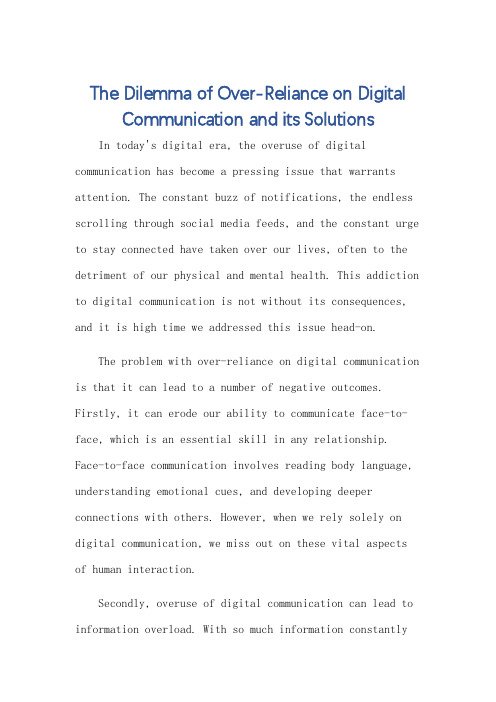
The Dilemma of Over-Reliance on Digital Communication and its SolutionsIn today's digital era, the overuse of digital communication has become a pressing issue that warrants attention. The constant buzz of notifications, the endless scrolling through social media feeds, and the constant urge to stay connected have taken over our lives, often to the detriment of our physical and mental health. This addiction to digital communication is not without its consequences, and it is high time we addressed this issue head-on.The problem with over-reliance on digital communication is that it can lead to a number of negative outcomes. Firstly, it can erode our ability to communicate face-to-face, which is an essential skill in any relationship. Face-to-face communication involves reading body language, understanding emotional cues, and developing deeper connections with others. However, when we rely solely on digital communication, we miss out on these vital aspects of human interaction.Secondly, overuse of digital communication can lead to information overload. With so much information constantlyflooding our screens, it becomes difficult to filter out what is important and what is not. This can lead to stress and anxiety, as we feel the need to keep up with everything, even if it does not pertain to us.Moreover, the constant connectedness through digital communication can disrupt our work-life balance. We find ourselves checking emails, social media, or text messages even when we should be focused on other tasks. Thisconstant interruption not only affects our productivity but can also lead to feelings of exhaustion and dissatisfaction. To address these issues, several solutions can be explored. Firstly, we need to cultivate the habit ofturning off our digital devices at least an hour before bedtime. This will help us establish a healthy sleeproutine and prevent the negative effects of blue light emissions from screens. Additionally, setting asidespecific times for checking emails or social media can help us avoid constant distractions and stay focused on our work. Secondly, we should make an effort to engage in face-to-face communication more often. This could meaninitiating conversations with family and friends, attendingsocial events, or even participating in group activities that involve interpersonal interaction. By doing so, we can enhance our social skills and develop deeper relationships with those around us.Lastly, we should aim to create boundaries when it comes to digital communication. This could mean setting limits on screen time, deleting unnecessary apps, or even taking periodic breaks from social media. By doing so, we can prevent information overload and protect our mental health.In conclusion, the overuse of digital communication is a real problem that can have significant impacts on our lives. By recognizing its negative consequences and implementing practical solutions, we can reclaim control of our digital habits and lead healthier, more fulfilling lives.**数字通讯过度使用的困境及其解决方案**在当今数字化时代,数字通讯的过度使用已成为一个亟待关注的问题。
如何应对信息过载英语作文

如何应对信息过载英语作文In today's digital age, we are constantly bombarded with an overwhelming amount of information. Whether it's through social media, news websites, or email subscriptions, we are constantly exposed to a never-ending stream of data. This phenomenon, known as information overload, can have detrimental effects on our productivity, mental health, and overall well-being. In this article, we will explore effective strategies to cope with information overload and regain control of our digital lives.First and foremost, it is crucial to prioritize the information we consume. With an abundance of information at our fingertips, it's easy to get caught up in the endless scrolling and clicking. To overcome this, we need to identify our goals and focus on the information that is relevant and beneficial to us. This could involve unsubscribing from unnecessary email newsletters, unfollowing social media accounts that do not add value, and setting specific time limits for browsing the internet.Additionally, developing critical thinking skills is essential in navigating through the vast sea of information. With the rise of fake news and misinformation, it is crucial to question the credibility and validity of the information we come across. Fact-checking, verifying sources, and cross-referencing information can help us make informed decisions and avoid falling into the trap of misinformation.Another effective strategy is to establish a digital detox routine. Taking regular breaks from technology can help alleviate the stress and overwhelm caused by information overload. This could involve setting aside designated periods of time each day to disconnect from our devices, engaging in activities that promote mindfulness and relaxation, such as reading a book, going for a walk, or practicing meditation. By consciously creating space for ourselves away from the constant influx of information, we can recharge and rejuvenate our minds.Moreover, organizing and curating the information we consume can significantly reduce the feeling of overload. Utilizing productivity tools such as note-taking apps, bookmarking websites, and creating digital folders can help us categorize and storeinformation in a structured manner. This not only allows for easy retrieval of relevant information when needed but also reduces the clutter and chaos associated with information overload.Furthermore, effective time management is crucial in combating information overload. With limited time and an abundance of information, it is essential to allocate our time wisely. Prioritizing tasks, setting realistic goals, and breaking them down into manageable chunks can help us stay focused and productive. Additionally, utilizing time management techniques such as the Pomodoro Technique, where work is divided into intervals with short breaks in between, can enhance productivity and prevent burnout.Lastly, practicing self-care is vital in maintaining a healthy balance in the face of information overload. Taking care of our physical and mental well-being is essential for optimum performance and resilience. This could involve getting enough sleep, exercising regularly, eating a balanced diet, and engaging in activities that bring joy and relaxation. By nurturing ourselves, we can better cope with the demands of the digital world and prevent information overload from taking a toll on our overall well-being.In conclusion, information overload is a prevalent issue in today's digital age. However, by implementing effective strategies such as prioritizing information, developing critical thinking skills, establishing a digital detox routine, organizing and curating information, practicing time management, and prioritizing self-care, we can successfully navigate through the overwhelming sea of information and regain control of our digital lives. By doing so, we can lead more balanced, productive, and fulfilling lives in this information-rich era.。
从信息论视角看公司简介英文译文的信息过载问题
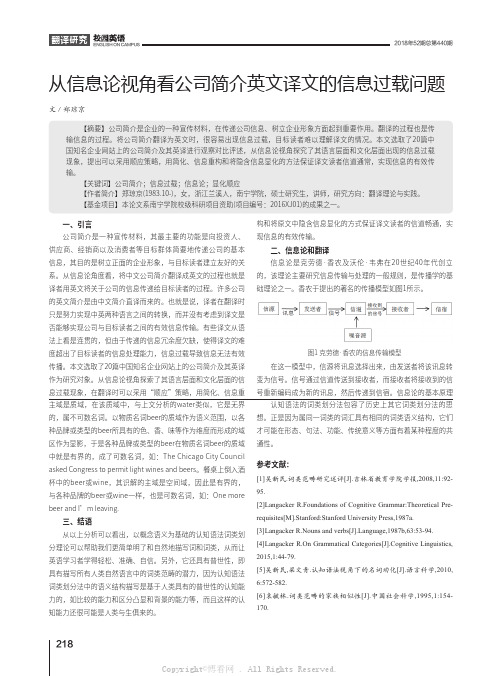
2182018年52期总第440期ENGLISH ON CAMPUS从信息论视角看公司简介英文译文的信息过载问题文/郑琼京【摘要】公司简介是企业的一种宣传材料,在传递公司信息、树立企业形象方面起到重要作用。
翻译的过程也是传输信息的过程。
将公司简介翻译为英文时,很容易出现信息过载,目标读者难以理解译文的情况。
本文选取了20篇中国知名企业网站上的公司简介及其英译进行观察对比评述,从信息论视角探究了其语言层面和文化层面出现的信息过载现象,提出可以采用顺应策略,用简化、信息重构和将隐含信息显化的方法保证译文读者信道通常,实现信息的有效传输。
【关键词】公司简介;信息过载;信息论;显化顺应【作者简介】郑琼京(1983.10-),女,浙江兰溪人,南宁学院,硕士研究生,讲师,研究方向:翻译理论与实践。
【基金项目】本论文系南宁学院校级科研项目资助(项目编号:2016XJ01)的成果之一。
一、引言公司简介是一种宣传材料,其最主要的功能是向投资人、供应商、经销商以及消费者等目标群体简要地传递公司的基本信息,其目的是树立正面的企业形象,与目标读者建立友好的关系。
从信息论角度看,将中文公司简介翻译成英文的过程也就是译者用英文将关于公司的信息传递给目标读者的过程。
许多公司的英文简介是由中文简介直译而来的。
也就是说,译者在翻译时只是努力实现中英两种语言之间的转换,而并没有考虑到译文是否能够实现公司与目标读者之间的有效信息传输。
有些译文从语法上看是连贯的,但由于传递的信息冗余度欠缺,使得译文的难度超出了目标读者的信息处理能力,信息过载导致信息无法有效传播。
本文选取了20篇中国知名企业网站上的公司简介及其英译作为研究对象。
从信息论视角探索了其语言层面和文化层面的信息过载现象,在翻译时可以采用“顺应”策略,用简化、信息重构和将原文中隐含信息显化的方式保证译文读者的信道畅通,实现信息的有效传输。
二、信息论和翻译信息论是克劳德·香农及沃伦·韦弗在20世纪40年代创立的,该理论主要研究信息传输与处理的一般规则,是传播学的基础理论之一。
从信息论角度探析汉译英过程中文化信息的冗余平衡——以《阿Q正

282017年/第一期/一月(上)从信息论角度探析汉译英过程中文化信息的冗余平衡——以《阿Q 正传》的英译本为例靳琼(河南财经政法大学河南・郑州450002)摘要随着学科融合的进一步发展,最初仅应用于通讯领域的信息论开始应用于翻译领域,并对翻译研究和实践产生了深远影响。
本文试图从信息论的角度,以《阿Q 正传》的英译本为研究材料,探究汉译英过程中文化信息的传达和实现冗余平衡的手段。
文章通过例证分析,提出四种可能的实现冗余平衡的方法。
关键词信息论冗余翻译中图分类号:H315.9文献标识码:ADOI:10.16400/ki.kjdks.2017.01.014On the Redundancy Balance of Cultural Information in the Process ofChinese English Translation from the Perspective of Information Theory——Take English version of "Ah Q"as an example JIN Qiong(Henan University of Economics and Law,Zhengzhou,Henan 450002)Abstract With the integration of different disciplines,Information Theory has been introduced into translation and has pro-duced profound influence on translation research and practice.This article takes the English versions of “The True Story of Ah Q ”as the research material,attempting to explore the process of cultural information transmission and methods to achieve re-dundancy equivalence from the perspective of Information Theory.Through illustration,this paper puts forward four possible ways to realize redundancy equivalence.Keywords Information Theory;redundancy;translation 1信息论信息论是20世纪40年代美国数学家香农创立的,根据香农的观点,信息的传递遵循以下模式:①在信息论视角下,信息传播通过的路径叫信道,信息从信源发出,在信道中通过编码,解码过程被传递到信宿。
信息膨胀英语作文
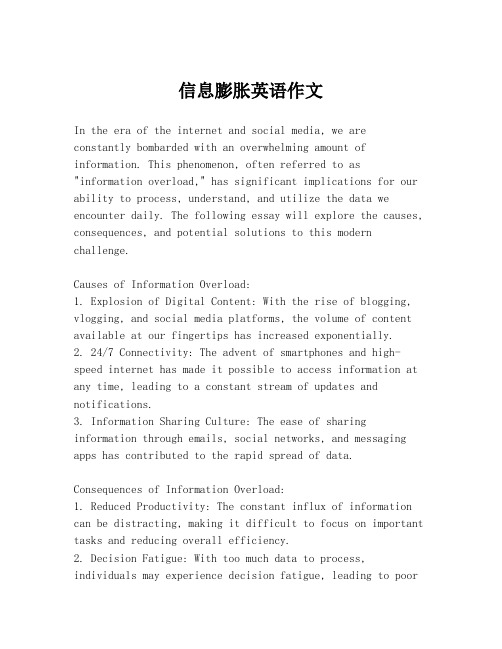
信息膨胀英语作文In the era of the internet and social media, we are constantly bombarded with an overwhelming amount of information. This phenomenon, often referred to as "information overload," has significant implications for our ability to process, understand, and utilize the data we encounter daily. The following essay will explore the causes, consequences, and potential solutions to this modern challenge.Causes of Information Overload:1. Explosion of Digital Content: With the rise of blogging, vlogging, and social media platforms, the volume of content available at our fingertips has increased exponentially.2. 24/7 Connectivity: The advent of smartphones and high-speed internet has made it possible to access information at any time, leading to a constant stream of updates and notifications.3. Information Sharing Culture: The ease of sharing information through emails, social networks, and messaging apps has contributed to the rapid spread of data.Consequences of Information Overload:1. Reduced Productivity: The constant influx of information can be distracting, making it difficult to focus on important tasks and reducing overall efficiency.2. Decision Fatigue: With too much data to process, individuals may experience decision fatigue, leading to poorchoices or avoidance of decision-making altogether.3. Mental Health Impact: Information overload has been linked to increased stress and anxiety levels, as individuals struggle to keep up with the flow of information.Potential Solutions:1. Implementing Digital Detox: Setting aside regular periods of time to disconnect from digital devices can help reduce the impact of information overload.2. Prioritizing Information: Learning to prioritize andfilter information based on relevance and importance can help manage the volume of data we consume.3. Utilizing Tools and Apps: Using tools that curate and organize information, such as news aggregators orproductivity apps, can help streamline the information we receive.In conclusion, information overload is a complex issue that requires a thoughtful approach to manage effectively. By understanding its causes and consequences, and by adopting strategies to mitigate its effects, we can maintain a healthier relationship with the information we consume. It is crucial to find a balance that allows us to stay informed without becoming overwhelmed by the digital deluge.。
数字通信过度使用的问题英语作文

数字通信过度使用的问题英语作文In the modern era, digital communication has become an integral part of our daily lives, facilitating instant connections across vast distances. However, the overuse of digital communication is a growing concern that warrants attention. This essay will explore the issues arising from our increasing reliance on digital platforms for interaction.Firstly, the overuse of digital communication can lead to a decline in face-to-face social skills. As people become more accustomed to expressing themselves through text and emojis, they may find it challenging to engage in meaningful, nuanced conversations in person. This can result in a lack of empathy and a reduced ability to read non-verbal cues, which are crucial for building deep and genuine relationships.Secondly, the constant connectivity encouraged by digital communication can blur the lines between work and personal life. The expectation to be available 24/7 can lead to increased stress and burnout. Workers may find it difficult to disconnect, leading to a lack of work-life balance and potentially impacting their mental health.Moreover, the overuse of digital platforms can also contribute to the spread of misinformation. The rapid sharing of information online, without proper fact-checking, can lead to the propagation of false news and ideas. This can have serious societal implications, as seen in the rise of fakenews influencing public opinion and political outcomes.Additionally, there is a concern about the impact of digital communication on children and adolescents. Excessive screen time can affect their physical health, sleep patterns, and cognitive development. Moreover, the pressure to maintain a digital presence can lead to issues such as cyberbullying and a negative impact on self-esteem.To mitigate these issues, it is essential to promote digital literacy and encourage responsible use of digital communication tools. This includes educating individuals about the importance of balancing online and offline interactions, setting boundaries for screen time, and verifying the authenticity of information before sharing it.In conclusion, while digital communication has revolutionized the way we connect with one another, its overuse poses significant challenges. It is crucial to recognize these problems and take proactive steps to ensure that digital communication enhances rather than diminishes our social interactions and overall well-being.。
信息过剩英文作文
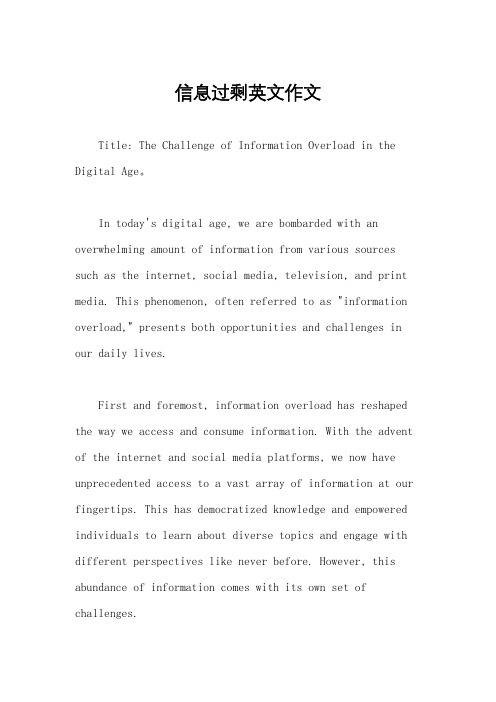
信息过剩英文作文Title: The Challenge of Information Overload in the Digital Age。
In today's digital age, we are bombarded with an overwhelming amount of information from various sources such as the internet, social media, television, and print media. This phenomenon, often referred to as "information overload," presents both opportunities and challenges in our daily lives.First and foremost, information overload has reshaped the way we access and consume information. With the advent of the internet and social media platforms, we now have unprecedented access to a vast array of information at our fingertips. This has democratized knowledge and empowered individuals to learn about diverse topics and engage with different perspectives like never before. However, this abundance of information comes with its own set of challenges.One of the primary challenges of information overloadis the difficulty in discerning the credibility andreliability of sources. With the proliferation of fake news, misinformation, and biased content online, it has become increasingly challenging to separate fact from fiction. Asa result, individuals must exercise critical thinkingskills and employ fact-checking mechanisms to navigate the digital landscape responsibly.Moreover, information overload can lead to cognitive overload and decision fatigue. When faced with an excessive amount of information, our cognitive resources become strained, making it difficult to process and retainrelevant information effectively. This can hinder ourability to make informed decisions and prioritize tasks, ultimately impacting our productivity and well-being.Furthermore, the constant barrage of information can also have detrimental effects on our mental health. Studies have shown that excessive use of social media and exposureto negative news can contribute to feelings of anxiety,stress, and depression. Moreover, the fear of missing out (FOMO) perpetuated by social media can exacerbate feelings of inadequacy and dissatisfaction with one's own life.In light of these challenges, it is imperative to develop strategies to cope with information overload effectively. One approach is to practice information literacy, which involves evaluating the credibility, relevance, and accuracy of sources before accepting them as true. By honing critical thinking skills and employing skepticism, individuals can become more discerning consumers of information.Additionally, setting boundaries and practicing digital detoxes can help mitigate the negative effects of information overload on mental well-being. Taking breaks from technology, engaging in mindfulness practices, and cultivating offline hobbies can provide much-needed respite from the constant barrage of information.Furthermore, adopting tools and techniques to manage and organize information can enhance productivity andreduce cognitive overload. This may include using productivity apps, creating to-do lists, and employing time management strategies to prioritize tasks effectively.In conclusion, while information overload is a pervasive challenge in today's digital age, it is not insurmountable. By cultivating critical thinking skills, practicing information literacy, and adopting strategies to manage information effectively, individuals can navigate the digital landscape with confidence and resilience. Moreover, by prioritizing mental well-being and practicing self-care, we can mitigate the negative effects of information overload and harness the power of information for positive change.。
信息爆炸 英语作文
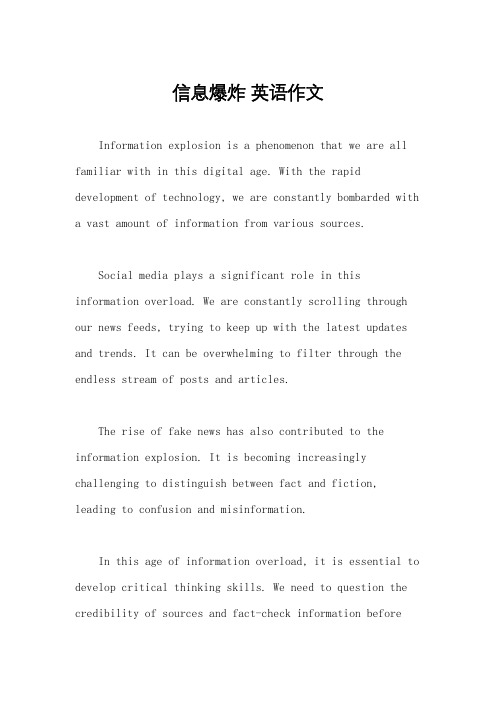
信息爆炸英语作文Information explosion is a phenomenon that we are all familiar with in this digital age. With the rapid development of technology, we are constantly bombarded with a vast amount of information from various sources.Social media plays a significant role in this information overload. We are constantly scrolling through our news feeds, trying to keep up with the latest updates and trends. It can be overwhelming to filter through the endless stream of posts and articles.The rise of fake news has also contributed to the information explosion. It is becoming increasingly challenging to distinguish between fact and fiction, leading to confusion and misinformation.In this age of information overload, it is essential to develop critical thinking skills. We need to question the credibility of sources and fact-check information beforesharing it with others.Despite the challenges posed by the information explosion, it also offers opportunities for learning and growth. We have access to a wealth of knowledge at our fingertips, allowing us to explore new ideas and perspectives.In conclusion, the information explosion is a double-edged sword. While it provides us with unprecedented access to information, it also presents challenges in terms of filtering and verifying the information we consume. It is crucial to approach the vast amount of informationavailable to us with a discerning eye and a critical mindset.。
中英译文对照-“信息超载综合征”
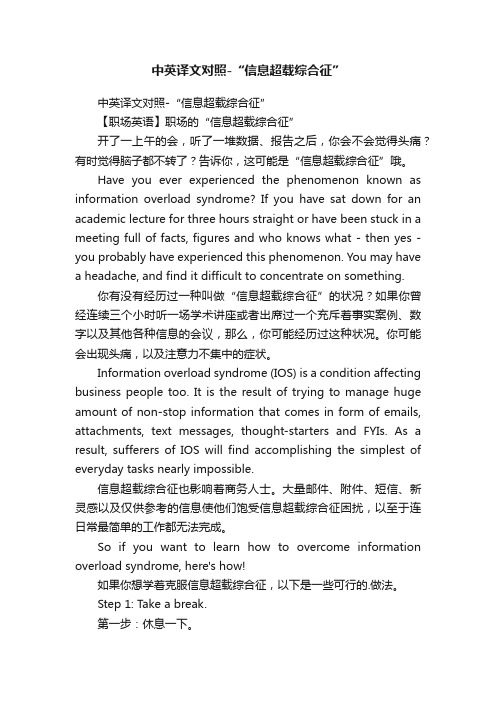
中英译文对照-“信息超载综合征”中英译文对照-“信息超载综合征”【职场英语】职场的“信息超载综合征”开了一上午的会,听了一堆数据、报告之后,你会不会觉得头痛?有时觉得脑子都不转了?告诉你,这可能是“信息超载综合征”哦。
Have you ever experienced the phenomenon known as information overload syndrome? If you have sat down for an academic lecture for three hours straight or have been stuck in a meeting full of facts, figures and who knows what - then yes - you probably have experienced this phenomenon. You may have a headache, and find it difficult to concentrate on something.你有没有经历过一种叫做“信息超载综合征”的状况?如果你曾经连续三个小时听一场学术讲座或者出席过一个充斥着事实案例、数字以及其他各种信息的会议,那么,你可能经历过这种状况。
你可能会出现头痛,以及注意力不集中的症状。
Information overload syndrome (IOS) is a condition affecting business people too. It is the result of trying to manage huge amount of non-stop information that comes in form of emails, attachments, text messages, thought-starters and FYIs. As a result, sufferers of IOS will find accomplishing the simplest of everyday tasks nearly impossible.信息超载综合征也影响着商务人士。
信息危机英语作文
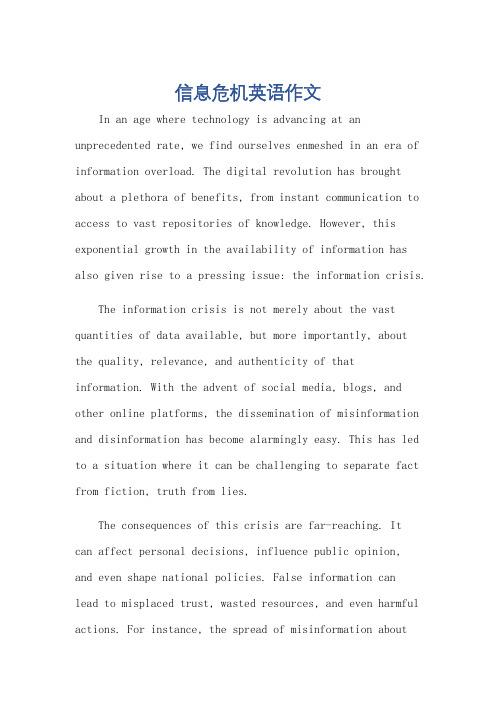
信息危机英语作文In an age where technology is advancing at an unprecedented rate, we find ourselves enmeshed in an era of information overload. The digital revolution has brought about a plethora of benefits, from instant communication to access to vast repositories of knowledge. However, this exponential growth in the availability of information has also given rise to a pressing issue: the information crisis. The information crisis is not merely about the vast quantities of data available, but more importantly, about the quality, relevance, and authenticity of that information. With the advent of social media, blogs, and other online platforms, the dissemination of misinformation and disinformation has become alarmingly easy. This has led to a situation where it can be challenging to separate fact from fiction, truth from lies.The consequences of this crisis are far-reaching. Itcan affect personal decisions, influence public opinion,and even shape national policies. False information canlead to misplaced trust, wasted resources, and even harmful actions. For instance, the spread of misinformation aboutvaccines has led to decreased vaccination rates,threatening public health on a global scale.To address this crisis, we need to adopt a multipronged approach. Firstly, we must improve our educational systemsto equip individuals with the skills to critically evaluate information. This involves teaching them how to identify reliable sources, detect biases, and evaluate evidence. Secondly, we need to enforce regulations to curb the spread of false information, especially on social media platforms. These platforms should be held accountable for the content they host and should take proactive measures to filter out harmful information.Moreover, we must also promote a culture of skepticism and skepticism among the masses. This means encouraging people to question authorities, challenge assumptions, and seek second opinions. A healthy skepticism can act as a bulwark against the spread of misinformation and disinformation.In conclusion, the information crisis is a complex problem that requires a concerted effort from all stakeholders. By improving education, enforcing regulations,and promoting skepticism, we can hope to mitigate the harmful effects of this crisis and move towards a more informed and responsible information ecosystem.**信息危机的曙光**在科技以前所未有的速度发展的时代,我们发现自己身陷信息过载的时代。
信息洪流谁来把关作文
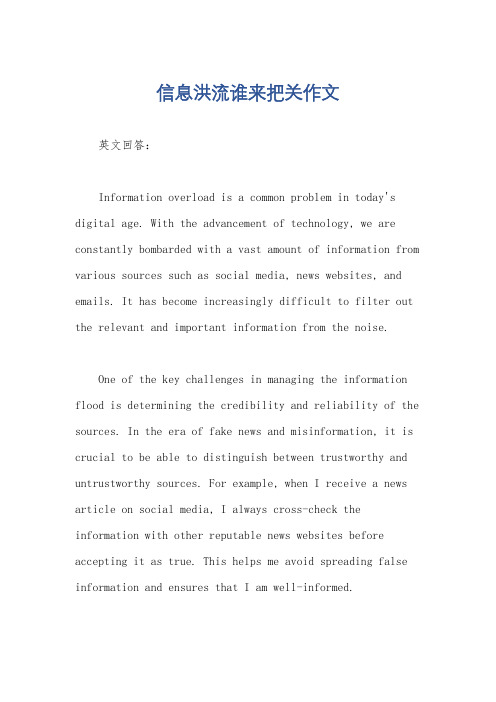
信息洪流谁来把关作文英文回答:Information overload is a common problem in today's digital age. With the advancement of technology, we are constantly bombarded with a vast amount of information from various sources such as social media, news websites, and emails. It has become increasingly difficult to filter out the relevant and important information from the noise.One of the key challenges in managing the information flood is determining the credibility and reliability of the sources. In the era of fake news and misinformation, it is crucial to be able to distinguish between trustworthy and untrustworthy sources. For example, when I receive a news article on social media, I always cross-check the information with other reputable news websites before accepting it as true. This helps me avoid spreading false information and ensures that I am well-informed.Another important aspect of managing the information overload is prioritization. With so much information available at our fingertips, it is easy to get overwhelmed and waste time on trivial matters. To overcome this, I have developed a habit of setting priorities and focusing on the most important tasks first. For instance, when I have a deadline to meet, I make sure to allocate dedicated timefor the task without getting distracted by unnecessary information.Furthermore, it is essential to develop effective information consumption habits. This includes being selective about the sources we follow and the content we consume. For instance, I have unsubscribed from irrelevant email newsletters and unfollowed social media accounts that do not add value to my life. By doing so, I am able to reduce the influx of unnecessary information and focus on what truly matters to me.In addition, technology can also be used as a tool to manage information overload. There are various apps and software available that can help in organizing andcategorizing information. For example, I use productivity apps to create to-do lists and organize my tasks based on their priority. This way, I can easily access the information I need without feeling overwhelmed by the sheer volume of data.中文回答:信息洪流是当今数字时代的一个常见问题。
信息过载主题英语作文
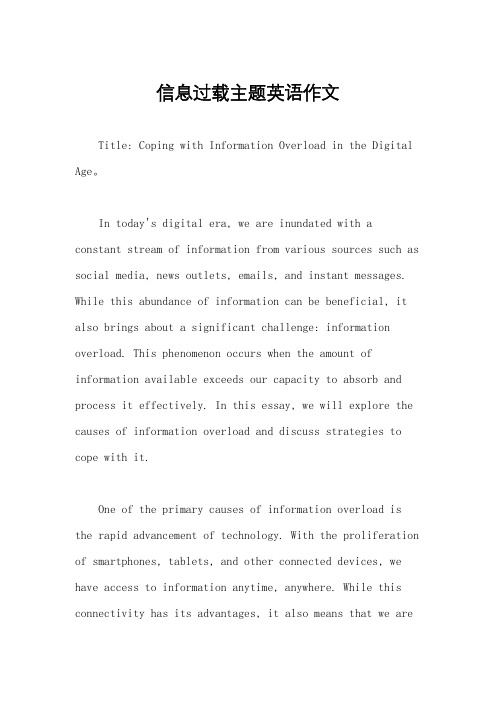
信息过载主题英语作文Title: Coping with Information Overload in the Digital Age。
In today's digital era, we are inundated with a constant stream of information from various sources such as social media, news outlets, emails, and instant messages. While this abundance of information can be beneficial, it also brings about a significant challenge: information overload. This phenomenon occurs when the amount of information available exceeds our capacity to absorb and process it effectively. In this essay, we will explore the causes of information overload and discuss strategies to cope with it.One of the primary causes of information overload is the rapid advancement of technology. With the proliferation of smartphones, tablets, and other connected devices, we have access to information anytime, anywhere. While this connectivity has its advantages, it also means that we areconstantly bombarded with notifications and updates, making it difficult to focus on important tasks.Moreover, the rise of social media has exacerbated the problem of information overload. Platforms like Facebook, Twitter, and Instagram constantly compete for our attention with an endless stream of posts, photos, and videos. As a result, we often find ourselves scrolling mindlesslythrough our feeds, consuming vast amounts of information without gaining much value from it.Another contributing factor to information overload is the increasing complexity of the information itself. In an age of big data and analytics, we are exposed to vast amounts of data and statistics that can be overwhelming to comprehend. Furthermore, the rapid pace of change in fields such as technology, politics, and economics means that new information is constantly emerging, adding to the deluge of data we must contend with.So, how can we cope with information overload in the digital age? One strategy is to practice selective exposure.Instead of trying to consume all the information available, we should prioritize our attention on sources that are relevant to our interests and goals. By focusing on quality rather than quantity, we can avoid feeling overwhelmed by the sheer volume of information out there.Another helpful strategy is to establish boundaries around our use of technology. This may involve setting specific times for checking emails and social media, or even taking regular digital detoxes to disconnect from the online world altogether. By creating space for quiet reflection and focused work, we can regain control over our attention and avoid being constantly pulled in multiple directions.Additionally, it's essential to develop critical thinking skills to evaluate the credibility and relevance of the information we encounter. With so much misinformation circulating online, it's crucial to question the sources and biases behind the information we consume. By approaching information with a skeptical mindset, we can avoid falling prey to falsehoods and propaganda.In conclusion, information overload is a significant challenge in today's digital age, but it is not insurmountable. By understanding the causes of information overload and implementing strategies to cope with it, we can navigate the sea of information more effectively and reclaim our focus and attention in an increasingly distracted world.。
三级笔译中有关领导和信息洪流的英文阅读
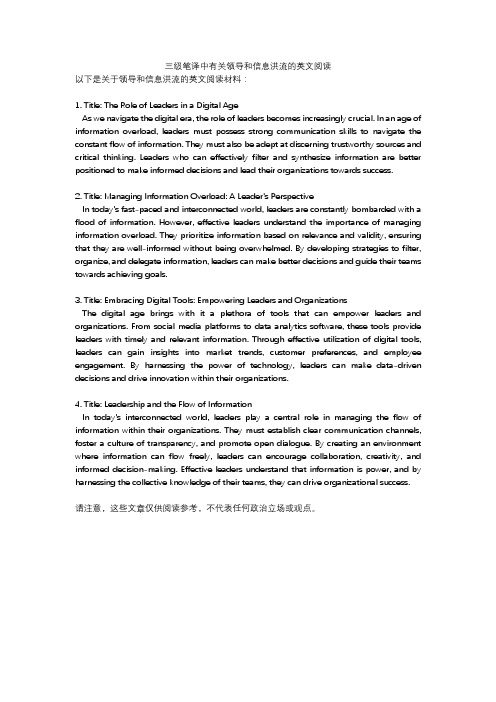
三级笔译中有关领导和信息洪流的英文阅读以下是关于领导和信息洪流的英文阅读材料:1. Title: The Role of Leaders in a Digital AgeAs we navigate the digital era, the role of leaders becomes increasingly crucial. In an age of information overload, leaders must possess strong communication skills to navigate the constant flow of information. They must also be adept at discerning trustworthy sources and critical thinking. Leaders who can effectively filter and synthesize information are better positioned to make informed decisions and lead their organizations towards success.2. Title: Managing Information Overload: A Leader's PerspectiveIn today's fast-paced and interconnected world, leaders are constantly bombarded with a flood of information. However, effective leaders understand the importance of managing information overload. They prioritize information based on relevance and validity, ensuring that they are well-informed without being overwhelmed. By developing strategies to filter, organize, and delegate information, leaders can make better decisions and guide their teams towards achieving goals.3. Title: Embracing Digital Tools: Empowering Leaders and OrganizationsThe digital age brings with it a plethora of tools that can empower leaders and organizations. From social media platforms to data analytics software, these tools provide leaders with timely and relevant information. Through effective utilization of digital tools, leaders can gain insights into market trends, customer preferences, and employee engagement. By harnessing the power of technology, leaders can make data-driven decisions and drive innovation within their organizations.4. Title: Leadership and the Flow of InformationIn today's interconnected world, leaders play a central role in managing the flow of information within their organizations. They must establish clear communication channels, foster a culture of transparency, and promote open dialogue. By creating an environment where information can flow freely, leaders can encourage collaboration, creativity, and informed decision-making. Effective leaders understand that information is power, and by harnessing the collective knowledge of their teams, they can drive organizational success.请注意,这些文章仅供阅读参考,不代表任何政治立场或观点。
- 1、下载文档前请自行甄别文档内容的完整性,平台不提供额外的编辑、内容补充、找答案等附加服务。
- 2、"仅部分预览"的文档,不可在线预览部分如存在完整性等问题,可反馈申请退款(可完整预览的文档不适用该条件!)。
- 3、如文档侵犯您的权益,请联系客服反馈,我们会尽快为您处理(人工客服工作时间:9:00-18:30)。
龙源期刊网 从信息论视角看公司简介英文译文的信息过载问题
作者:郑琼京
来源:《校园英语·月末》2018年第13期
【摘要】公司简介是企业的一种宣传材料,在传递公司信息、树立企业形象方面起到重要作用。
翻译的过程也是传输信息的过程。
将公司简介翻译为英文时,很容易出现信息过载,目标读者难以理解译文的情况。
本文选取了20篇中国知名企业网站上的公司简介及其英译进行观察对比评述,从信息论视角探究了其语言层面和文化层面出现的信息过载现象,提出可以采用顺应策略,用简化、信息重构和将隐含信息显化的方法保证译文读者信道通常,实现信息的有效传输。
【关键词】公司简介;信息过载;信息论;显化顺应
【作者简介】郑琼京(1983.10-),女,浙江兰溪人,南宁学院,硕士研究生,讲师,研究方向:翻译理论与实践。
【基金项目】本论文系南宁学院校级科研项目资助(项目编号:2016XJ01)的成果之一。
一、引言
公司简介是一种宣传材料,其最主要的功能是向投资人、供应商、经销商以及消费者等目标群体简要地传递公司的基本信息,其目的是树立正面的企业形象,与目标读者建立友好的关系。
从信息论角度看,将中文公司简介翻译成英文的过程也就是译者用英文将关于公司的信息传递给目标读者的过程。
许多公司的英文简介是由中文简介直译而来的。
也就是说,译者在翻译时只是努力实现中英两种语言之间的转换,而并没有考虑到译文是否能够实现公司与目标读者之间的有效信息传输。
有些译文从语法上看是连贯的,但由于传递的信息冗余度欠缺,使得译文的难度超出了目标读者的信息处理能力,信息过载导致信息无法有效传播。
本文选取了20篇中国知名企业网站上的公司簡介及其英译作为研究对象。
从信息论视角探索了其语言层
面和文化层面的信息过载现象,在翻译时可以采用“顺应”策略,用简化、信息重构和将原文中隐含信息显化的方式保证译文读者的信道畅通,实现信息的有效传输。
二、信息论和翻译
信息论是克劳德·香农及沃伦·韦弗在20世纪40年代创立的,该理论主要研究信息传输与处理的一般规则,是传播学的基础理论之一。
香农于提出的著名的传播模型如图1所示。
